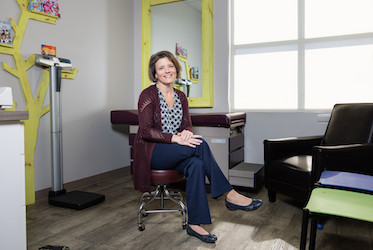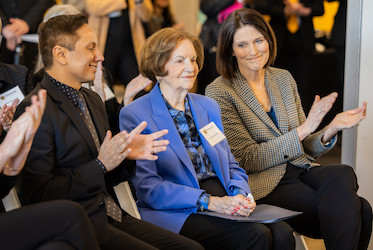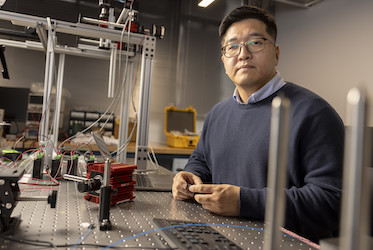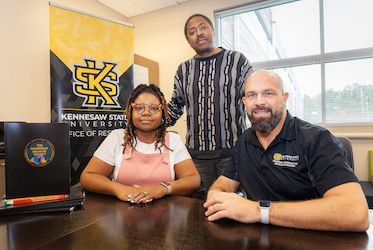
Exploring the Possibilities of Research
KENNESAW, Ga. | Jun 8, 2020
First-Year Scholars Program launched
The First-Year Scholars Program, established in fall 2019, is igniting students’ interest in research by helping them connect with experienced faculty mentors. That is the reasoning behind the design of this unique program, according to Amy Buddie, director of the Office of Undergraduate Research at Kennesaw State.
“Studies suggest that early engagement in research is associated with positive outcomes, such as improved retention, progression, graduation rates and increased enrollment in graduate school,” said Buddie, who is also a professor of psychology. “Students strengthen skills such as critical thinking, public speaking and writing.”
For the past 15 years, KSU has provided opportunities for students to engage in mentored research and scholarship across disciplines and participate in all phases of the research process. Buddie said that it was logical to take the next step and expand the research experiences to focus on first-year students.
“We hope that this early undergraduate research experience will set the foundation for future success for these First-Year Scholars,” she said. “The skills they are building now are more typically learned as juniors and seniors. This experience will be invaluable to them moving forward in their college careers.”
Through a competitive process, the program pairs students with faculty mentors who guide them on research in their respective fields. The students, who each receive a stipend, serve as apprentices actively engaged in the faculty mentors’ projects for a year, and present their results at the annual Symposium of Student Scholars at KSU in late spring.
Ten professors who were already involved in undergraduate research were chosen by Buddie for the pilot year. These professors come from various disciplines, ranging from art and design to exercise science and sport management. They also receive professional development funding to be used for their projects during the academic year.
Martin Hudson, a popular mentor choice among the first-year students, is a neuroscientist studying nervous system development in nematodes (worms) and stem cells.
In the end, three applicants – Michaela Crego, a biochemistry major from Lilburn, Georgia; Lauren James, an environmental science major from Cumming, Georgia; and David Jimenez, a microbiology major from Eastanollee, Georgia – were chosen. There was only one problem: the First-Year Scholars Program could only fund one student per research mentor. Luckily, Hudson had a research grant that he was able to use to support the remaining two students.
“I am happy with the resulting group, as they are diverse in terms of majors and talents, and they each bring something different to the laboratory. The First-Year Scholars demonstrate great passion for their work, as well as foresight about their future research goals,” Hudson said.
For the First-Year Scholars Program, Hudson is currently focusing on two projects with his students. The projects include investigating how cells become neurons in the nervous system and how they navigate, making the right connections to communicate to other cells in the body. Transcription factors, proteins that bind to DNA and control which genes are transcribed into RNA, are crucially important to this process and are a major focus of Hudson’s research.
Hudson conducts these studies with the hope of understanding the genetic origins behind human neurological disorders. He uses small nematodes, or worms known as C. elegans, which are extremely easy to maintain and perform genetic manipulations on, as a tool for his studies.
Worms share many of the same genes as humans, so information discovered about the worm can be applied to human systems. To study a worm’s neurophysiology, he and his team use a noninvasive way of recording cellular activity via a high-end microscope and computer imaging.
Crego, who always knew she had a passion for biology, is responsible for taking pictures of the worms at different magnifications on the specialized microscope to get a better look since the C. elegans have transparent bodies and are only one millimeter in length.
“Learning some basics immediately grabbed my attention because there is so much more to learn with these worms than many people think,” said Crego.
James said her favorite task is imaging worms that fluoresce different colors under the right conditions to observe the worm’s inner workings highlighted by the colors.
“I feel that working in a lab has reaffirmed my desire to conduct research in my field of environmental science, and I will continue to seek out similar opportunities in the future,” said James.
Jimenez, who would like to pursue a doctorate in microbiology, prefers picking the worms, which takes patience and a very steady hand to accomplish quickly.
“I have always loved biology, but the First-Year Scholars Program opportunity took it to a new level,” said Jimenez. “It was my first real experience looking into the unknown. I get to see things every day that 99% of people may never see in their lives. I find that amazing!”
Although Hudson has only worked with these students for one full semester thus far, he said he plans to challenge them more in the lab. By giving the students their own projects, they will be able to practice accountability and focus, two important traits of a researcher.
“I’m really interested in developing the next generation of scientists,” said Hudson. “My philosophy is to start a research career early. Students are poised to gain more skills if they spend more time working in a laboratory. Some of these skills are rare in undergraduates and make them more competitive applicants should they choose to pursue a Ph.D.
– Kaelyn Ireland and Geena Lawrence
Related Stories

Kennesaw State researcher applies mathematical modeling expertise to health care systems

Kennesaw State Academic Learning Center named for longtime family benefactors

Kennesaw State receives grant to help children with sickle cell disease

Kennesaw State receives $2.5 million grant to foster student success in calculus
A leader in innovative teaching and learning, Kennesaw State University offers undergraduate, graduate and doctoral degrees to its more than 45,000 students. Kennesaw State is a member of the University System of Georgia with 11 academic colleges. The university’s vibrant campus culture, diverse population, strong global ties and entrepreneurial spirit draw students from throughout the country and the world. Kennesaw State is a Carnegie-designated doctoral research institution (R2), placing it among an elite group of only 7 percent of U.S. colleges and universities with an R1 or R2 status. For more information, visit kennesaw.edu.
















